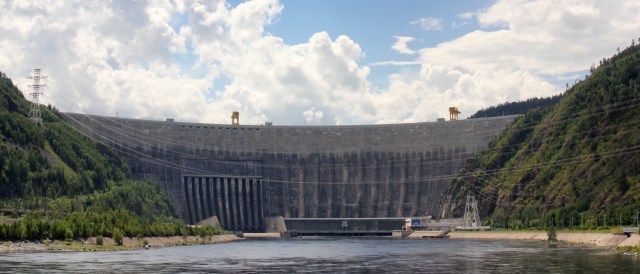The German word Energiewende has yet to be adopted in Russia, where analysts are skeptical about the German energy transition. There the media presents it as an interesting but rather bizarre experiment which only a rich country like Germany can afford, finds Komila Nabiyeva.

Russia has historically had a high share of hydro power in its electricity mix – other sources of renewables remain critically underdeveloped: In 2006, Russia had 15MW of wind power capacity, whereas Germany had already installed more than 20.000MW. (Photo by Bubensteyn, CC BY-SA 3.0)
The first thing Peter the Great did when ruling Russia in the late 17th century was take a one-year trip to Western Europe, including the German kingdom of Prussia. Upon his return, Peter started a whole range of reforms to modernize his country. As a result, scores of German words made their way into the Russian language.
Today’s Russians are more skeptical of the political decisions of their Western partner, such as the German government’s push in the aftermath of the Fukushima disaster to phase out nuclear energy and switch to renewables. And the German word describing this process, familiar to almost the entire rest of the world, has yet to make its way into the Russian lexicon: Energiewende.
The main message one gets from media reports in energy superpower Russia: Germany’s energy transition is an expensive and rather bizarre experiment which only a well-off country can afford. No surprise that the Russian reports of what happens in Germany focus on rising electricity prices, given the unbalanced picture of the energiewende in many German media reports, including Der Spiegel and the Frankfurter Allgemeine Zeitung.
No wonder that the February 2013 statement by German Environment Minister Peter Altmaier that the clean energy transition would cost Germany one trillion euros in the next twenty years made headlines in Russia. Only the massive public demonstrations against nuclear power after Fukushima and the record production of solar energy in May 2012 enjoyed similar media attention in Russia.
Three main narratives repeated in many Russian media reports are rising electricity prices, increased coal generation, and consequences for the Russian gas industry. In April 2013 the popular news channel NTV looked into “Germany’s Dead End: Where did new energy policies lead the country?” [RU]. Focusing first on the boom in renewable energy in Germany, the report next presents a “normal” family struggling with a 47% increase in electricity prices in 2013, then examines potential risks for the Russian gas industry as a result of the German energy transition and the shale gas boom in the US.
Similar narratives can be found in an anti-energiewende report by Russia’s government-owned news service Russia Today (RT). In October 2013, Moscow’s CNN-wannabe ran a piece called “Germany’s ‘green energy revolution’ costing billions,” according to which average German consumers cannot afford the “Robin Hood-like subsidies to green energy” which “drive up energy prices and suck profits from energy companies.”
The report interviews a single mother in Berlin who cannot pay her electricity bills, an anti-wind activist who says “green energy is anchored in the German psyche. It gets backing even when it harms us,” and Frank Schäffler from Germany’s Free Democratic Party (FDP), who tells us the Energiewende is destructive and expensive for businesses. The choice of Schäffler as an interviewee appears strange considering the FDP was ousted from both the government and the Bundestag in September elections in part because of their stand against renewable policies in the country. The article doesn’t mention the benefits of the energiewende, nor the fact that, according to the latest public surveys, more than 80 percent of Germans support the energiewende and wish for a better political management of its course.
At times the German transition to renewables is portrayed as a strange hobby or whim. In October 2013 government-backed station Perviy Kanal ran a piece entitled ,“Craze for energy-saving technologies seizes Germany” [RU], which reports Germans are increasingly moving to eco-houses and eco-villages. The article fails to mention the financial schemes backing individual producers of renewable energy.
The good news is that despite their small readership (less than 100,000 each) newspapers like Kommersant and Nezavisimaya Gazeta offer more balanced reporting about the developments in the green energy sector in Germany and its possible spillover effects for Russia. And the base for such spillover is getting better. In May 2013 Russia started its own renewable energy support scheme. Then-President Medvedev adopted a policy supporting a limited number of renewable energy producers so long as part of the equipment is produced domestically.
Yet as long as policies supporting renewables are portrayed by the Russian media as expensive and bizarre, it will take the renewables market in Russia more time to get off the ground. To balance the Russian understanding of the energiewende, there is a need for more exchange and dialogue between Russia and Germany, as well as accessible facts and figures of what is happening in Germany. Despite Russia’s vast fossil fuel resource base, experts see huge potential for renewable energies in remote areas of the country.
One-sided and inaccurate media coverage of the energiewende can be found not only in Russia, but also in the US, the UK, and in Germany’s neighbors Poland and the Czech Republic. Partial blame rests with the German government, which until recently was too busy sorting out domestic issues and not doing enough for the external communications strategy of its energy transition.
So here is a message for new Energy Minister Sigmar Gabriel: it is time not only to improve the management of the energy transition domestically, but also to improve its rather gloomy image abroad. And who knows – perhaps then “energiewende” will finally be registered in Russian dictionaries, a reform it seems even Peter the Great would have approved.
Komila Nabiyeva reports on climate change, energy, and development issues in Eastern Europe and Central Asia. This article was first published on the Going Renewable blog.
Great. I found my picture here!